
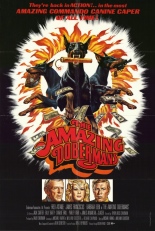 Until recently, the Doberman movies of the 1970s represented that rarest of film franchises: a series I didn’t even know existed. Indies all directed by one Byron Chudnow, they walk a weird line between comedies and crime films, all featuring Doberman Pinschers trained to commit and/or thwart felonies. Ostensibly family pictures, they’re kind of weird; therefore, I love them.
Until recently, the Doberman movies of the 1970s represented that rarest of film franchises: a series I didn’t even know existed. Indies all directed by one Byron Chudnow, they walk a weird line between comedies and crime films, all featuring Doberman Pinschers trained to commit and/or thwart felonies. Ostensibly family pictures, they’re kind of weird; therefore, I love them.
Following The Doberman Gang and The Daring Dobermans — in which the dogs robbed a bank and pulled off a high-rise heist, respectively — the five canines return in The Amazing Dobermans as guard dogs to freelancing security expert Daniel (Fred Astaire), an ex-con turned Jesus freak who lives in an RV. Daniel does no dancing, but plenty of Scripture-quoting and, via a chunky remote control with buttons marked “jump” and “go,” dog manipulation.
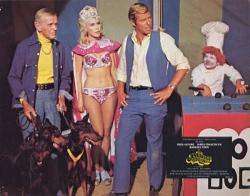 Crossing their paths is Lucky (James Franciscus), who owes $13,000 in gambling debts to a mob boss, but is really a Justice Department agent undercover. To that end, Lucky befriends a circus midget named Samson (Billy Barty), gets a job shoveling elephant poo, and falls for Justice (Barbara Eden), who rides Wonder Horse under the big top in a bejeweled bikini that highlights her great ass.
Crossing their paths is Lucky (James Franciscus), who owes $13,000 in gambling debts to a mob boss, but is really a Justice Department agent undercover. To that end, Lucky befriends a circus midget named Samson (Billy Barty), gets a job shoveling elephant poo, and falls for Justice (Barbara Eden), who rides Wonder Horse under the big top in a bejeweled bikini that highlights her great ass.
From there, a third-act caper takes place that involves the Dobermans, dynamite, an armored car and a goon who looks Gene Shalit. Like the two films preceding it, Amazing is harmless fun. What else would you expect from a movie where one of the bad guys is played by somebody named Roger Pancake? —Rod Lott

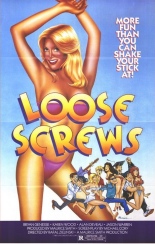
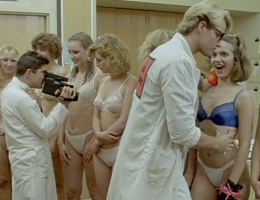 Both films conclude with the four plucky young assholes coming together to unclothe the objects of their desire in front of large audiences. In the first film, they use magnets; in the second, an unspecified gaseous aphrodisiac.
Both films conclude with the four plucky young assholes coming together to unclothe the objects of their desire in front of large audiences. In the first film, they use magnets; in the second, an unspecified gaseous aphrodisiac.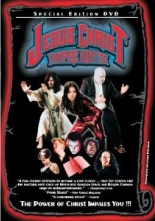
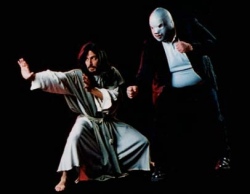 Billed as a “kung-fu action/comedy/horror/musical about the second coming,” JCVH is one for the (rock of) ages. Directed by Lee Demarbre, the picture can’t be accused of having low production values because it has no production values at all. Non-actor Phil Caracas has the title role, and if Jesus ever looked down from his Throne of Gold at people on Earth and laughingly mumbled “you assholes,” he was probably catching a midnight screening of this movie.
Billed as a “kung-fu action/comedy/horror/musical about the second coming,” JCVH is one for the (rock of) ages. Directed by Lee Demarbre, the picture can’t be accused of having low production values because it has no production values at all. Non-actor Phil Caracas has the title role, and if Jesus ever looked down from his Throne of Gold at people on Earth and laughingly mumbled “you assholes,” he was probably catching a midnight screening of this movie.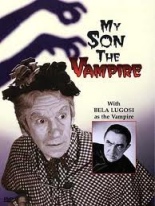
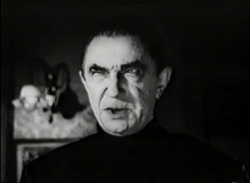 It’s the last film in Britain’s
It’s the last film in Britain’s 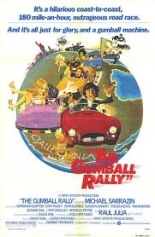
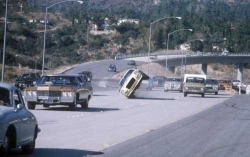 Although The Gumball Rally lacks the star power of Needham’s films, its lack of recognizable celebrities is mitigated by the fact that its cast actually made the effort to inhabit likable characters, rather than just mug shamelessly until the director announced it was time to get back to the hotel and par-tay.
Although The Gumball Rally lacks the star power of Needham’s films, its lack of recognizable celebrities is mitigated by the fact that its cast actually made the effort to inhabit likable characters, rather than just mug shamelessly until the director announced it was time to get back to the hotel and par-tay.